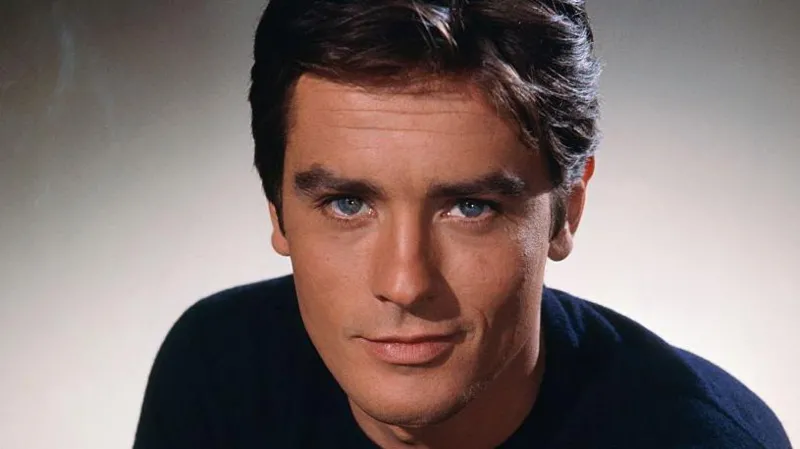PARIS – Alain Delon, the legendary French actor celebrated for his tough-guy persona and smoldering screen presence, has died at the age of 88.
Delon, a star of the golden era of French cinema, was known for his iconic roles in films such as “The Samurai” and “Borsalino.” His death marks the end of an era, leaving behind a legacy that has shaped French and international cinema.
Delon, who had been in poor health in recent years, passed away peacefully at his home in Douchy, surrounded by his three children and family.
The news was confirmed by his family in a statement, expressing their deep sadness at the loss of their father. His dog, Loubo, was also by his side.
A Career That Defined an Era
Alain Delon’s career spanned over five decades, during which he made nearly 90 films. His magnetic presence and striking looks earned him the title of “the most beautiful man in the movies.”
Delon captivated audiences with his performances in classic films from the 1960s, including “The Leopard” and “Rocco and His Brothers.” Whether portraying a cold-blooded murderer or a charming conman, Delon’s performances were marked by a unique blend of intensity and charisma.
Brigitte Bardot, another icon of French cinema, led the tributes to Delon, describing his death as leaving a “huge void that nothing and no-one will be able to fill.” She remembered him as an ambassador of elegance, talent, and beauty, and mourned the loss of a friend and partner.
A Symbol of French Prestige Cinema
French President Emmanuel Macron also paid tribute to Delon, acknowledging his legendary roles that made the world dream. In a statement on X, formerly known as Twitter, Macron called Delon “more than a star: he was a French monument.”
Delon’s contribution to cinema was not only in the roles he played but in the very essence of his being, embodying a melancholic, popular, and secretive persona that resonated deeply with audiences.
Gilles Jacob, former president of the Cannes Film Festival, described Delon as “a lion… an actor with a steely gaze,” while Alberto Barbera, director of the Venice Film Festival, hailed him as an “icon” who had ascended to “the Olympus of the immortals.”
Personal Life and Controversies
While Delon’s professional life was marked by success and adulation, his personal life was often tumultuous and controversial. His relationships and political views frequently made headlines, drawing both admiration and criticism.
Delon was known for his support of Jean-Marie Le Pen, leader of the far-right National Front, whose stances on issues like the death penalty and same-sex marriage were highly contentious.
Delon’s love life was equally colorful and complex. He had three children – two sons and a daughter – by two different women, and a third son who remained unacknowledged and has since passed away.
In recent years, his family life has been marred by public disputes, legal battles, and accusations. Following his stroke in 2019, disagreements over his medical treatment and other issues led to a series of bitter exchanges among his children, which played out in the media.
A Final Farewell
Delon’s last major public appearance was at the Cannes Film Festival in May 2019, where he received an honorary Palme d’Or.
In an emotional speech, he seemed to bid farewell to cinema, describing the award as “a bit of a posthumous tribute, but from my lifetime.” He expressed his gratitude to his fans and the film community, acknowledging that his time was coming to an end.
Despite his declining health and the controversies surrounding his personal life, Delon’s legacy in cinema remains untarnished.
His performances continue to inspire and captivate new generations of film enthusiasts. The tributes pouring in from fans, colleagues, and leaders around the world underscore the profound impact he had on the film industry and popular culture.
Remembering a Legend
As the news of Delon’s death spread, tributes and condolences poured in from all corners of the globe. Fans gathered outside his property in Douchy, leaving flowers and messages of love and respect. One fan, reacting to the news, told Reuters, “I thought he could never die.”
Le Parisian newspaper described Delon as “a legend of the cinema,” while Liberation called him “a leading figure of cinema, symbol of shadowy masculinity, the actor with crazy charisma.” Delon’s death marks the end of an era in French cinema, but his influence and legacy will continue to endure.
A Complex Legacy
Delon’s life was a blend of triumphs and tribulations, a narrative of brilliance and controversy.
His support for far-right politics and allegations of misogyny cast shadows on his public image. Yet, his contributions to cinema, his embodiment of French elegance, and his iconic roles have cemented his place in the pantheon of film legends.
In February of this year, Delon made headlines when French police seized 72 firearms and 3,000 rounds of ammunition from his home, citing his lack of a gun license.
A shooting range was also discovered at his mansion in Douchy-Montcorbon, adding another layer of intrigue to his storied life.
Final Years
In April, a judge placed Delon under “reinforced curatorship,” restricting his ability to manage his assets fully.
This decision was part of a broader narrative of declining health and increasing dependence on his family. His former housekeeper, Hiromi Rollin, also filed a suit against Delon’s children, accusing them of endangering his life by denying him necessary medication.
Despite these challenges, Delon’s contributions to cinema remain his most enduring legacy. His films, his performances, and his indomitable spirit have left an indelible mark on the world of cinema.
Conclusion
Alain Delon’s death is a significant loss to the world of cinema. His legacy, however, is immortal.
He remains a symbol of French prestige cinema, a testament to the power of film to captivate, inspire, and provoke. As the world mourns his passing, it also celebrates the remarkable life and career of a true cinematic legend.



